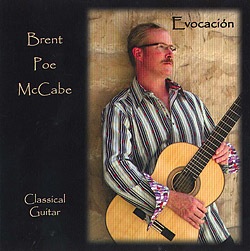
Dillon classical guitarist and educator Brent Poe McCabe has put out his third CD, and it’s filled with 11 compositions by some of the genre’s masters.
The Juilliard-trained, UM Western music professor is a critically acclaimed artist, having performed on this continent and abroad. He’s received many awards for his playing and taught oodles of music courses, and shows his versatility here in a solo compendium of styles.
The album starts with a composition by Brazilian composer João Pernambuco, titled, “Sons de Carrilhões.” It’s a dance called a chôro-maxixe, and has a plucky, recognizable melody that McCabe sails through. The second piece, “Estudio No. 18,” by the neo-classical Cuban guitarist and avant-garde performer Leo Brouwer, constructs twittery patterns, cascading and building to the theme. McCabe’s fingers flutter like a bird’s. Delightful!
Spanish composer Isaac Albéniz gives us “Mallorca,” a Barcarolle, or boat song, replete with many bass notes and arpeggios playing off them, in a pretty dissonance. McCabe shows his brilliant technique on this one, effortlessly executing the intricate guitar patterns while retaining the piece’s majesty.
The next three works are waltzes written by Venezuelan guitarist Antonio Lauro. “Natalia” swirls and sways, its exotic rhythms propelling the song along. “Andreina” is the same ilk – we feel like sashaying around the ballroom, while McCabe chords and strokes the strings to the lively dance beat. “El Marabino” is a bit more complicated yet also very danceable.
“Study No. 20 op. 31,” by Spanish composer Fernando Sor, is moody, stoic and soulful. It rolls and roils as McCabe plays fluidly and cleanly finger-picks the melody.
The rushing notes of Albéniz’ “Asturias” greet us next, ominous and thrilling; we expect the dancers with castanets to appear at any moment. It’s a long, riveting piece that finally draws a tranquil breath, wherein McCabe plays octave notes in unison, before building once again and exiting softly. Whew! A terrific performance.
Next up is a strident, loving tribute to McCabe’s instrument, aptly titled “Serenado por Gitaro,” by Lou Harrison. Written in 1952, it sounds distinctly modern. The finale is Brouwer’s dreamy “Cancion de Cuna,” a lullaby that tiptoes in and sweetly regales us before it leaves.
All in all, this is a well-produced collection of expertly played melodies by a very accomplished performer. Pick this one up to lighten the doldrums of these gray days.
Visit the artist at www.brentpoemccabe.com.
– Mariss McTucker